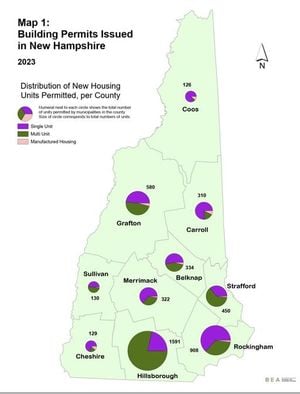The Brithdir Mawr community, tucked away within the breathtaking landscapes of the Preseli mountains in west Wales, finds itself at the center of an eviction battle, threatening to end over 30 years of cooperative living.
Once regarded as a hidden gem where residents shared home-cooked meals made from locally grown produce, members are now grappling with the unsettling reality of having to leave their cherished land. The 80-acre site was recently sold to a woman named Rachel May, who now aims to transform the location, where community members have flourished, including growing their own food and raising livestock, for use as a healing retreat.
“The uncertainty is very difficult and unpleasant,” said Will Cooke, who has resided here for four and half years. He expressed the deep connection the residents feel to the land, likening their uprooting to the impossibility of moving mature trees, stating, “You don’t just move an oak tree. It won’t work.”
Rachel May's decision to purchase the land and her subsequent legal actions against the current tenants generates unease among community members, who suspect elements of "colonialism" within her motivations. Cooke, noting her status as the new landowner, stressed how her wealth affords her power over the land and community. The residents feel displaced and alienated by the shift from cooperative ideals toward financial interests.
Following their notification on January 17 to vacate the premises after their tenancy supposedly ended on December 31, the mood at Brithdir Mawr has been somber. Their plight led to the departure of some community members, including all children, but six adults and three long-term volunteers remain resolute. On February 8, they plan to hold a “We’re still here” gathering to assert their presence, chanting defiance reminiscent of the Welsh folk song Yma o Hyd.
Nick Ward, whose two children were raised within the safe confines of this community, lamented how significant the place has been for them. “It was an amazing place to bring them up,” he said. “They had freedom and thrived. What is happening makes us all very sad.”
The community has articulated to May their firm belief against the legal route for resolution, advocating for alternative solutions rooted in cooperation and communal living. They do not harbor animosity toward her, feeling instead victimized by what they describe as systemic failings.
Brithdir Mawr, which translates to “large patchwork,” signifies more than just its name; the co-operative has worked to cultivate meaningful connections across all levels—people, land, and the environment. Founded discreetly back in 1994, it gained international attention following its discovery by survey planes, leading to portrayals of its residents as remnants of a “lost tribe.” Their mission has always focused on fostering community vitality, eco-centric living, and cultural ties.
Despite the challenges posed by the impending eviction, Brithdir Mawr community members remain committed to their mission. They have welcomed various volunteers over the years, taught courses on self-sufficiency and Celtic languages, and liaised with the Welsh One Planet Development policy, advocating for eco-friendly housing initiatives.
The new owner, Rachel May, whose background includes work as a teacher and doula, has expressed intentions to renovate existing structures to establish her wellness retreat, which she claims will benefit community connections with nature. “I told them I was willing to negotiate but...they were not interested...,” she related, referring to her attempts to discuss her new vision with existing residents.
May firmly denies accusations of colonialism, asserting she has deep local ties and has sold her family home to invest personally to realize her dream for the retreat. “I am not a corporate landlord. Some of the community members cannot or will not admit I own the land. They refuse to face the facts,” she stated, depicting her challenge as one of misunderstood intentions.
Emma Orbach, one of Brithdir Mawr’s founders now residing on adjacent property, views the situation as distressing yet believes there’s potential for collaboration with May. She explained, “It’s not just about land and getting things from it; it’s about our spirtual connection to the land.”
While these discussions transpire, daily life at Brithdir Mawr continues as the community tends to their livestock and nurtures their gardens, holding onto memories of shared meals and camaraderie. Anne, caring for the goats, struggled with sadness when asked about the eviction: “I’m heartbroken, that's the truth.”
Local supporter Rosie Gillam, who recalls joyous childhood visits to learn circus skills at Brithdir Mawr, voiced her concern for the future of such communal spaces. “This is such a special spot. There needs to be more places like this, not fewer.”
The future remains uncertain for the Brithdir Mawr community, but their resolve to preserve both their home and way of life shines bright against the looming threat of eviction.



